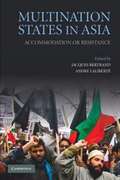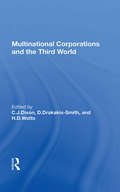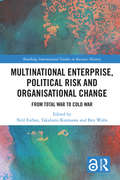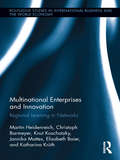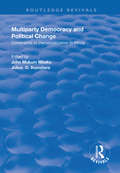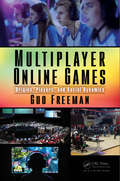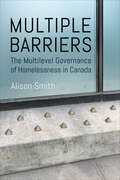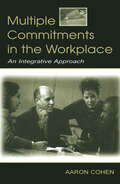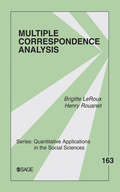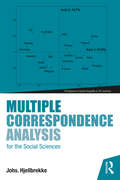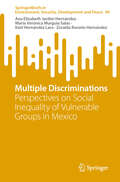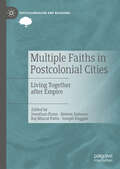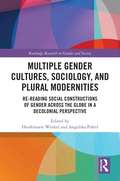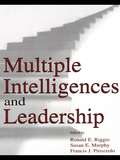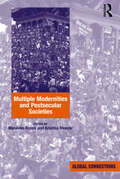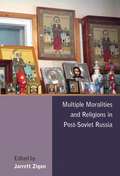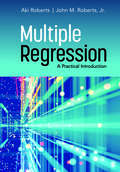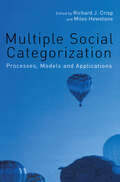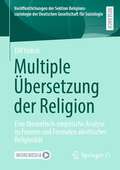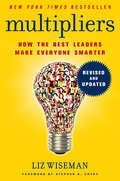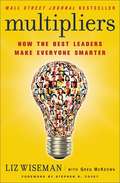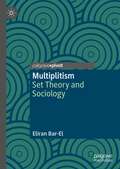- Table View
- List View
Multination States in Asia
by Jacques Bertrand André LalibertéAs countries in Asia try to create unified polities, many face challenges from minority groups within their own borders seeking independence. This volume brings together international experts on countries in all regions of Asia to debate how differently they have responded to this problem. Why have some Asian countries, for example, clamped down on their national minorities in favour of homogeneity, whereas others have been willing to accommodate statehood or at least some form of political autonomy? Together they suggest broad patterns and explanatory factors that are rooted in the domestic arena, including state structure and regime type, as well as historical trajectories. In particular, they find that the paths to independence, as well as the cultural elements that have been selected to define post-colonial identities, have decisively influenced state strategies. This is a global phenomenon - and the book explains the broader theoretical and political implications - but violence and ethnic unrest have been particularly prevalent in Asia, and this is as true of China in its relationship to Tibet, as of Burma and Sri Lanka in relation to their national minorities. As the first book to analyse this phenomenon across Asia, it will attract a readership of students and scholars across a broad range of disciplines.
Multinational Companies and Domestic Firms in Europe. Comparing Wages, Working Conditions and Industrial Relations
by Maarten Van Klaveren Kea Tijdens Denis GregoryThe Social Effects of FDI on Multinational Companies and Domestic Firms compares and contrasts wages, working conditions and industrial relations processes in multinational and domestic companies. This book is an effort to map the social effects of FDI in a number of EU member states, in relation to the prevailing patterns of internationalization.
Multinational Corporations And The Third World
by C.J. DixonThis book, an outcome of the conference in 1983 held at the University of Birmingham, examines the varied roles played by multinational corporations in the economies of the Third World countries and concentrates more closely on regional, national, sectoral or corporate levels.
Multinational Enterprise, Political Risk and Organisational Change: From Total War to Cold War (Routledge International Studies in Business History)
by Neil Forbes Ben Wubs Takafumi KurosawaHitherto, the organization of international business has been studied mostly from a managerial point of view or by examining the relationship between firms and the economy. Yet, the development of the modern, multinational firm - the most important type of business organisation - has been strongly influenced by the conflicts that bedeviled the twentieth century. The volatile macroeconomic and political environments experienced by international business point to how important it is to study political risk. Consequently, Multinational Enterprise, Political Risk and Organisational Change: From Total War to Cold War breaks new ground: it argues that non-market elements and historical context are key to understanding the way international business has been organised. This edited volume offers an historical approach to analysing how multinational enterprise has developed over time and around the world, through a series of well-crafted chapters, on important topics in international economic and business history, written by authorities in their respective fields of study and research. The study is based on the underlying premise that the coming of the two World Wars, the devastating and long-term consequences of such total wars, and the ideological challenge of the Cold War acted as a pivot points in shaping the nature and character of multinational firms. By examining such phenomena, this study offers insights to anyone who has an interest in business, economic or political history, management and business studies, or international relations.
Multinational Enterprises and Innovation: Regional Learning in Networks (Routledge Studies in International Business and the World Economy)
by Martin Heidenreich Katharina Krüth Christoph Barmeyer Knut Koschatzky Jannika Mattes Elisabeth BaierThe crucial actors of a global knowledge-based economy are multinational enterprises (MNEs). MNEs depend on the embeddedness in an institutional framework; their competitive advantage depends on the cross-border utilisation of regional and national capabilities. The innovativeness of a company is therefore based also on regional innovation systems. Multinational Enterprises and Innovation contributes to a better understanding of the interconnectedness between organisational and regional learning. On the basis of case studies in Germany and France, this volume investigates how MNEs cope with technical, economic and institutional uncertainties by drawing upon the complementary strengths of organisational and regional networks in national and European contexts. The book links two theoretical debates which are currently still largely disconnected -- the debate on learning processes in MNEs and the debate on the regional bases of innovativeness and competitiveness -- answering the question of how the internationalisation of R&D is reconciled with regional competences.
Multinational Retailers and Consumers in China
by Jos GambleRising prosperity and a rapidly commercializing economy have transformed post-Mao China into the world's largest and most rapidly growing emerging market. Until the early 1990s, its retail sector remained largely closed to overseas retailers. Since then, this sector has gradually opened to foreign involvement, a process boosted by China joining the World Trade Organization in 2001. China now constitutes an increasingly significant market for overseas retailers. Based upon extensive first hand comparative research conducted at multinational retailers from the United Kingdom and Japan, this book investigates the transfer of parent country organizational practices by these retailers to their Chinese subsidiaries. Providing insights into employment relations in multinational retail firms as well as changing labour-management systems in China, this book delineates some of their impactson consumer culture in a developing country. "
Multiparty Democracy and Political Change: Constraints to Democratization in Africa (Routledge Revivals)
by John Mukum Mbaku Julius O. IhonvbereFirst published in 1998, This book is written by seasoned scholars of African Studies and it intended to make a significant contribution to the debate on democracy and democratization in the continent. It contains a rich mixture of analytical ideas and views on the transition to accountable, participatory, and democratic governance structures in Africa. It provides both students of African political economy and policymakers in the continent and in-depth analysis of the post-independence experience of African countries with institutional reforms. Specifically, it looks at the struggles of Africans, since independence, to provide themselves with more appropriate and viable governance structures and economic systems that enhance the ability to entrepreneurs to create wealth. The Book breaks new ground in that it places significant emphasis on the reconstruction of the neo-colonial state as an important first step to a successful transition to democratic and more accountable governance structures.
Multiplayer Online Games: Origins, Players, and Social Dynamics
by Guo FreemanMultiplayer Online Games (MOGs) have become a new genre of "play culture," integrating communication and entertainment in a playful, computer-mediated environment that evolves through user interaction. This book comprehensively reviews the origins, players, and social dynamics of MOGs, as well as six major empirical research methods used in previous works to study MOGs (i.e., observation/ethnography, survey/interviews, content and discourse analysis, experiments, network analysis, and case studies). It concludes that MOGs represent a highly sophisticated, networked, multimedia and multimodal Internet technology, which can construct entertaining, simultaneous, persistent social virtual worlds for gamers. Overall, the book shows that what we can learn from MOGs is how games and gaming, as ubiquitous activities, fit into ordinary life in today’s information society, in the moments where the increased use of media as entertainment, the widespread application of networked information technologies, and participation in new social experiences intersect. <P><P>Key Features: <li>Contains pertinent knowledge about online gaming: its history, technical features, player characteristics, social dynamics, and research methods <li>Sheds light on the potential future of online gaming, and how this would impact every aspect of our everyday lives – socially, culturally, technologically, and economically <li>Asks promising questions based on cutting-edge research in the field of online game design and development
Multiple Barriers: The Multilevel Governance of Homelessness in Canada (Studies in Comparative Political Economy and Public Policy)
by Alison SmithDespite decades of efforts to combat homelessness, many people continue to experience it in Canada’s major cities. There are a number of barriers that prevent effective responses to homelessness, including a lack of agreement on the fundamental question: what is homelessness? In Multiple Barriers, Alison Smith explores the forces that shape intergovernmental and multilevel governance dynamics to help better understand why, despite the best efforts of community and advocacy groups, homelessness remains as persistent as ever. Drawing on nearly 100 interviews with key actors in Vancouver, Calgary, Toronto, and Montreal, as well as extensive participant observation, Smith argues that institutional differences across cities interact with ideas regarding homelessness to contribute to very different models of governance. Multiple Barriers shows that the genuine involvement of locally based service providers, with the development of policy, are necessary for an effective, equitable, and enduring solution to the homelessness crisis in Canada.
Multiple Commitments in the Workplace: An Integrative Approach (Applied Psychology Series)
by Aaron CohenThe growing interest in multiple commitments among researchers and practitioners is evinced by the greater attention in the literature to the broader concept of work commitment. This includes specific objects of commitment, such as organization, work group, occupation, the union, and one's job. In the last several years a sizable body of research has accumulated on the multidimensional approach to commitment. This knowledge needs to be marshaled, its strengths highlighted, and its importance, as well as some of its weaknesses made known, with the aim of guiding future research on commitment based on a multidimensional approach. This book's purpose is to summarize this knowledge, as well as to suggest ideas and directions for future research. Most of the book addresses what seems to be the important aspects of commitment by a multidimensional approach: the differences among these forms, the definition and boundaries of commitment foci as part of a multidimensional approach, their interrelationships, and their effect on outcomes, mainly work outcomes. Two chapters concern aspects rarely examined--the relationship of commitment foci to aspects of nonwork domains and cross-cultural aspects of commitment foci--that should be important topics for future research. Addressing innovative focuses of multiple commitments at work, this book: *suggests a provocative and innovative approach on how to conceptualize and understand multiple commitments in the workplace; *provides a thorough and updated review of the existing research on multiple commitments; *analyzes the relationships among commitment forms and how they might affect behavior at work; and *covers topics rarely covered in multiple commitment research and includes all common scales of commitment forms that can assist researchers and practitioners in measuring commitment forms.
Multiple Correspondence Analysis (Quantitative Applications in the Social Sciences)
by Brigitte Le Roux Henry RouanetRequiring no prior knowledge of correspondence analysis, this text provides a nontechnical introduction to Multiple Correspondence Analysis (MCA) as a method in its own right. The authors, Brigitte LeRoux and Henry Rouanet, present thematerial in a practical manner, keeping the needs of researchers foremost in mind.Key FeaturesReaders learn how to construct geometric spaces from relevant data, formulate questions of interest, and link statistical interpretation to geometric representations.They also learn how to perform structured data analysis and to draw inferential conclusions from MCA.The text uses real examples to help explain concepts.The authors stress the distinctive capacity of MCA to handle full-scale research studies.This supplementary text is appropriate for any graduate-level, intermediate, or advanced statistics course across the social and behavioral sciences, as well as for individual researchers.
Multiple Correspondence Analysis for the Social Sciences
by Johs. HjellbrekkeMultiple correspondence analysis (MCA) is a statistical technique that first and foremost has become known through the work of the late Pierre Bourdieu (1930–2002). This book will introduce readers to the fundamental properties, procedures and rules of interpretation of the most commonly used forms of correspondence analysis. The book is written as a non-technical introduction, intended for the advanced undergraduate level and onwards. MCA represents and models data sets as clouds of points in a multidimensional Euclidean space. The interpretation of the data is based on these clouds of points. In seven chapters, this non-technical book will provide the reader with a comprehensive introduction and the needed knowledge to do analyses on his/her own: CA, MCA, specific MCA, the integration of MCA and variance analysis, of MCA and ascending hierarchical cluster analysis and class-specific MCA on subgroups. Special attention will be given to the construction of social spaces, to the construction of typologies and to group internal oppositions. This is a book on data analysis for the social sciences rather than a book on statistics. The main emphasis is on how to apply MCA to the analysis of practical research questions. It does not require a solid understanding of statistics and/or mathematics, and provides the reader with the needed knowledge to do analyses on his/her own.
Multiple Discriminations: Perspectives on Social Inequality of Vulnerable Groups in Mexico (SpringerBriefs in Environment, Security, Development and Peace #40)
by Ana Elizabeth Jardón Hernández María Verónica Murguía Salas Itzel Hernández Lara Zoraida Ronzón HernándezThe research results are integrated into this book account for the complexity of social contexts within the State of Mexico, while also highlighting the prevalence of discriminatory practices in different social spheres, with a particular emphasis on the labor sector: difficulties in accessing employment, labor exploitation, lack of recognition of their capabilities, absence of regulation and institutional support, etc., framed within various forms of inequality and power relations between international migrants, indigenous women, young people, and the ageing.To contribute and delve deeper into the understanding of this social issue in the State of Mexico, this work aims to analyze the different expressions of discrimination experienced by these groups of vulnerable populations, to recover experiences and perspectives from specific cases that highlight the urgency of strengthening strategies and actions aimed at building peaceful, tolerant, and inclusive societies in Mexico.
Multiple Faiths in Postcolonial Cities: Living Together after Empire (Postcolonialism and Religions)
by Jonathan Dunn Heleen Joziasse Raj Bharat Patta Joseph DugganThis book addresses the challenges of living together after empire in many post-colonial cities. It is organized in two sections. The first section focuses on efforts by people of multiple faiths to live together within their contexts, including such efforts within a neighborhood in urban Manchester; the array of attempts at creating multi-faith spaces for worship across the globe; and initiatives to commemorate divisive conflict together in Northern Ireland. The second section utilizes particular postcolonial methods to illuminate pressing issues within specific contexts—including women’s leadership in an indigenous denomination in the variegated African landscape, and baptism and discipleship among Dalit communities in India. In the context of growing multiculturalism in the West, this volume offers a postcolonial theological resource, challenging the epistemologies in the Western academy.
Multiple Gender Cultures, Sociology, and Plural Modernities: Re-reading Social Constructions of Gender across the Globe in a Decolonial Perspective (Routledge Research in Gender and Society)
by Angelika Poferl Heidemarie WinkelUntil today, Western, European sociology contributes to the social reality of colonial modernity, and gender knowledge is a paradigmatic example of it. Multiple Gender Cultures, Sociology, and Plural Modernities critically engages with these ‘Western eyes’ and shifts the focus towards the global variety of gendered socialities and hierarchically entangled social histories. This is conceptualised as multiple gender cultures within plural modernities. The authors examine the multifaceted realities of gendered life in varying contexts across the globe. Bringing together different perspectives, the volume provides a rereading of the social fabric of gender in contrast to androcentrist-modernist as well as orientalist representations of ‘the’ gendered Other. The key questions explored by this volume are: which social mechanisms lead to conflicting or shifting gender dynamics against the backdrop of global entanglements and interdependencies, and to what extent are neocolonial gender regimes at work in this regard? How are varying gender cultures sociohistorically and culturally structured, and how are they connected within (global) power relations? How can established hierarchies and asymmetries become an object of criticism? How can historical, cultural, social, and political specificities be analysed without gendered and other reifications? That way, the volume aims to promote border thinking in sociological understanding of social reality towards multiple gender cultures and plural modernities.
Multiple Intelligences and Leadership (Organization and Management Series)
by Susan E. Murphy Ronald E. Riggio Francis J. PirozzoloThis edited book presents cutting-edge research looking at the role of multiple intelligence--cognitive (IQ), emotional intelligence, social intelligence--in effective leadership, written by the most distinguished scholars in the two distinct fields of intelligence and leadership. The synergy of bringing together both traditional intelligence researchers and renowned leadership scholars to discuss how multiple forms of intelligence impact leadership has important implications for the study and the practice of organizational and political leadership. This volume emanates from the recent explosion of interest in non-IQ domains of intelligence, particularly in Emotional Intelligence and Social Intelligence. Indeed, the leading EI and SI scholars have contributed to this book. Research described in this book suggests that: (1) possession of multiple forms of intelligence is important for effective leadership; (2) researchers are just beginning to understand the breadth, depth, and potential applications of non-IQ domains of intelligence; (3) incorporating multiple intelligence constructs into existing leadership theories will improve our understanding of effective leadership; and (4) research on multiple intelligence has important implications for both the selection and training of future leaders.
Multiple Modernities and Postsecular Societies (Global Connections Ser.)
by Kristina StoecklEngaging with the idea that the world reveals not one, but many routes to modernity, this volume explores the role of religion in the emergence of multiple forms of modernity, which evolve according to specific cultural conditions and interpretations of the 'modern project'. It draws upon case study material from Africa, The Middle East, Russia and South America to examine the question of whether modernity, democracy and secularism are universalistic concepts or are, on the contrary, unique to Western civilization, whilst considering the relationship of postsecularism to the varied paths of modern development. Drawing together work from leading social theorists, this critical theoretical contribution to current debates will appeal to sociologists, social theorists and political scientists, with interests in religion, secularization and postsecularization theory and transitions to modernity in the contemporary globalized world.
Multiple Moralities And Religions In Post-soviet Russia
by Jarrett ZigonIn the post-Soviet period morality became a debatable concept, open to a multitude of expressions and performances. From Russian Orthodoxy to Islam, from shamanism to Protestantism, religions of various kinds provided some of the first possible alternative moral discourses and practices after the end of the Soviet system. This influence remains strong today. Within the Russian context, religion and morality intersect in such social domains as the relief of social suffering, the interpretation of history, the construction and reconstruction of traditions, individual and social health, and business practices. The influence of religion is also apparent in the way in which the Russian Orthodox Church increasingly acts as the moral voice of the government. The wide-ranging topics in this ethnographically based volume show the broad religious influence on both discursive and everyday moralities. The contributors reveal that although religion is a significant aspect of the various assemblages of morality, much like in other parts of the world, religion in postsocialist Russia cannot be separated from the political or economic or transnational institutional aspects of morality.
Multiple Regression: A Practical Introduction
by John M. Roberts Aki RobertsMultiple Regression: A Practical Introduction is a text for an advanced undergraduate or beginning graduate course in statistics for social science and related fields. Also, students preparing for more advanced courses can self-study the text to refresh and solidify their statistical background. Drawing on decades of teaching this material, the authors present the ideas in an approachable and nontechnical manner, with no expectation that readers have more than a standard introductory statistics course as background. Multiple regression asks how a dependent variable is related to, or predicted by, a set of independent variables. The book includes many interesting example analyses and interpretations, along with exercises. Each dataset used for the examples and exercises is small enough for readers to easily grasp the entire dataset and its analysis with respect to the specific statistical techniques covered. SPSS, Stata, SAS, and R code and commands for each type of analysis or recoding of variables in the book are available on an accompanying website, along with solutions to the exercises (on the instructor site).
Multiple Regression: A Practical Introduction
by John M. Roberts Aki RobertsMultiple Regression: A Practical Introduction is a text for an advanced undergraduate or beginning graduate course in statistics for social science and related fields. Also, students preparing for more advanced courses can self-study the text to refresh and solidify their statistical background. Drawing on decades of teaching this material, the authors present the ideas in an approachable and nontechnical manner, with no expectation that readers have more than a standard introductory statistics course as background. Multiple regression asks how a dependent variable is related to, or predicted by, a set of independent variables. The book includes many interesting example analyses and interpretations, along with exercises. Each dataset used for the examples and exercises is small enough for readers to easily grasp the entire dataset and its analysis with respect to the specific statistical techniques covered. SPSS, Stata, SAS, and R code and commands for each type of analysis or recoding of variables in the book are available on an accompanying website, along with solutions to the exercises (on the instructor site).
Multiple Social Categorization: Processes, Models and Applications
by Richard J. Crisp Miles Hewstone'Ethnic cleansing', 'institutional racism', and 'social exclusion' are just some of the terms used to describe one of the most pressing social issues facing today’s societies: prejudice and intergroup discrimination. Invariably, these pervasive social problems can be traced back to differences in religion, ethnicity, or countless other bases of group membership: the social categories to which people belong. Social categorization, how we classify ourselves and others, exerts a profound influence on our thoughts, beliefs, feelings, and behaviors. In this volume, Richard Crisp and Miles Hewstone bring together a selection of leading figures in the social sciences to focus on a rapidly emerging, but critically important, new question: how, when, and why do people classify others along multiple dimensions of social categorization? The volume also explores what this means for social behavior, and what implications multiple and complex perceptions of category membership might have for reducing prejudice, discrimination, and social exclusion. Topics covered include: the cognitive, motivational, and affective implications of multiple categorization the crossed categorization and common ingroup methods of reducing prejudice and intergroup discrimination the nature of social categorization among multicultural, multiethnic, and multilingual individuals. Multiple Social Categorization: Process, Models and Applications addresses issues that are central to social psychology and will be of particular interest to those studying or researching in the fields of Group Processes and Intergroup Relations.
Multiple Übersetzung der Religion: Eine theoretisch-empirische Analyse zu Formen und Formaten alevitischer Religiosität (Veröffentlichungen der Sektion Religionssoziologie der Deutschen Gesellschaft für Soziologie)
by Elif YıldızlıDas Anliegen der vorliegenden Untersuchung ist es, mit der Theorie der multiplen Differenzierung einen soziologischen Blick auf Religion und die besonderen Übersetzungsverhältnisse am Beispiel der organisations- und milieuspezifischen Lage der Aleviten in der Türkei zu werfen. Dabei werden die spezifischen Anerkennungs-, Aushandlungs- und Transformationsprozesse der alevitischen Glaubensgemeinschaft betrachtet. Elif Yıldızlı arbeitet die Spannungen im Kontext von Religion in der modernen Gesellschaft und die Paradoxien zwischen verschiedenen (religiösen) Formen und der Funktion der sozialen Integration heraus. Dafür ist die Konzeptualisierung der Differenzierung u. a. zwischen (alevitischer) Organisation und (alevitischem) Milieu notwendig. Somit trägt diese Arbeit mit einer aufwendigen theoretisch-empirischen Analyse zur (religions-) soziologischen Erforschung verschiedener Integrationsformen der Aleviten bei als Beispiel für die Ausdifferenzierung einer neuen religiösen Milieutypologie.
Multipliers, Revised and Updated: How the Best Leaders Make Everyone Smarter
by Liz WisemanA revised and updated edition of the acclaimed Wall Street Journal bestseller that explores why some leaders drain capability and intelligence from their teams while others amplify it to produce better results.We’ve all had experience with two dramatically different types of leaders. The first type drains intelligence, energy, and capability from the people around them and always needs to be the smartest person in the room. These are the idea killers, the energy sappers, the diminishers of talent and commitment. On the other side of the spectrum are leaders who use their intelligence to amplify the smarts and capabilities of the people around them. When these leaders walk into a room, light bulbs go off over people’s heads; ideas flow and problems get solved. These are the leaders who inspire employees to stretch themselves to deliver results that surpass expectations. These are the Multipliers. And the world needs more of them, especially now when leaders are expected to do more with less. In this engaging and highly practical book, leadership expert Liz Wiseman explores these two leadership styles, persuasively showing how Multipliers can have a resoundingly positive and profitable effect on organizations—getting more done with fewer resources, developing and attracting talent, and cultivating new ideas and energy to drive organizational change and innovation. In analyzing data from more than 150 leaders, Wiseman has identified five disciplines that distinguish Multipliers from Diminishers. These five disciplines are not based on innate talent; indeed, they are skills and practices that everyone can learn to use—even lifelong and recalcitrant Diminishers. Lively, real-world case studies and practical tips and techniques bring to life each of these principles, showing you how to become a Multiplier too, whether you are a new or an experienced manager. This revered classic has been updated with new examples of Multipliers, as well as two new chapters one on accidental Diminishers, and one on how to deal with Diminishers.Just imagine what you could accomplish if you could harness all the energy and intelligence around you. Multipliers will show you how.
Multipliers: How the Best Leaders Make Everyone Smarter
by Liz Wiseman Greg MckeownWiseman and McKeown (Wiseman Group, leadership research and development) identify two types of leaders, the energy draining idea killers and the leaders who inspire employees to work more creatively and surpass their own expectations. The authors have discovered five disciplines that distinguish between the two leadership types and share the skills and practices that help create positive, creative, inspiring leaders.
Multiplitism: Set Theory and Sociology
by Eliran Bar-ElThis book presents a set theoretical approach to sociological research. It revisits existing sociological approaches and discusses their limitations, before suggesting an alternative. While the existing canonical approaches of Positivism, Conflictualism, and Pragmatism are based on biology, history, and physics, respectively, the set theoretical approach is based on mathematics. Utilising its philosophical exploration delineated by Alain Badiou, the book further translates his work into the field of social science. The result of this translation is termed Multiplitism, which evades the limiting contradictions of existing approaches. Drawing on the mathematical notion of ‘set’ and relating it to recent sociological turns such as the relational and the ontological, the book proposes a scale-relativity through which the researcher (as subject) and the researched (as object) are integrated. The book will be of interest to social scientists, particularly social theorists and advanced level students.
